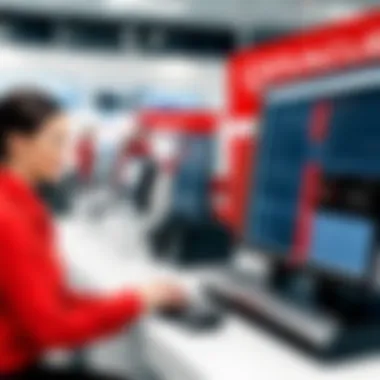Exploring the Oracle POS System: Features and Benefits


Intro
The Oracle Point of Sale System stands out as a modern solution for businesses seeking to streamline their transaction management and improve operational efficiency. In today's fast-paced market, organizations require tools that not only keep pace but also enhance their ability to serve customers effectively. The Oracle POS System answers this demand through an integrated approach that brings together various features designed to tackle the complexities of sales transactions and inventory management.
In this article, we will explore the key features of the Oracle POS System, highlighting its unique advantages over more traditional systems. Furthermore, we will assess various pricing models and delve into an analysis of return on investment (ROI) to better understand the financial benefits of adopting this advanced technology. By providing detailed insights and comparisons with competing systems, we aim to offer valuable information for decision-makers and IT professionals deliberating the transition to a more robust point of sale infrastructure.
With the growing reliance on technology within business operations, understanding tools like the Oracle POS System becomes increasingly vital for success.
Preface to Oracle Point of Sale System
The Oracle Point of Sale (POS) System is an essential component for modern businesses. In an era where customer experience and operational efficiency drive profitability, understanding the key elements of the Oracle POS System is vital for any organization. This section will explore fundamental features, advantages, and considerations for implementing the Oracle POS System in diverse business environments.
Oracle's system is recognized for its ability to streamline transactions and integrate various operations seamlessly. The key elements include user-friendly interfaces, real-time inventory tracking, and comprehensive payment processing solutions. By focusing on these aspects, businesses can enhance overall efficiency and improve customer satisfaction.
Furthermore, choosing the right POS system can have a significant impact on an organization’s ability to scale and adapt in a competitive market. The introduction to the Oracle POS System sets the stage for a broader discussion on its features, benefits, and solutions for businesses aiming to upgrade their transaction management.
Overview of POS Systems
Point of Sale systems have evolved considerably over the years. Traditionally, POS systems provided basic functionalities for transaction processing. Today, they are multifaceted platforms capable of handling a wide range of business operations. These systems incorporate inventory management, customer relationship management, and sales analysis, among other functionalities.
Businesses can select from various types of POS systems, including traditional, mobile, and cloud-based solutions. Each type has its own benefits which cater to specific business needs. Understanding the landscape of POS systems allows organizations to make informed choices, ensuring they select a solution that aligns with their operational goals.
Evolution of Oracle in Retail Technology
Oracle has a rich history in retail technology, which has allowed it to remain at the forefront of the POS market. The brand has continually adapted its offerings to meet changing consumer needs and market conditions. From early database solutions to cutting-edge cloud services, Oracle has reshaped retail technology.
The evolution involves integrating advanced analytics and machine learning, which help businesses gain deeper insights into customer behavior and sales trends. By harnessing these technologies, retailers can personalize shopping experiences and adjust strategies in real-time. This continuous innovation reflects Oracle's commitment to providing comprehensive solutions that enhance business performance and customer engagement.
"The shift towards integrated retail technology signifies that businesses must prioritize modern POS systems to remain competitive in today's market."
Understanding Oracle's journey in retail technology provides valuable insight into how its POS solutions can help businesses grow. By leveraging Oracle's experience and advanced capabilities, organizations are equipped to navigate the complexities of today’s retail environment, ensuring they are prepared for future challenges.
Key Features of Oracle POS System
The Oracle Point of Sale System is designed to meet the demands of modern retail environments. Its key features set it apart from other systems, providing essential tools for businesses. Understanding these features is critical for organizations looking to optimize their transaction processes and improve overall efficiency.
User Interface and Usability
A significant aspect of any POS system is user interface (UI) design. The Oracle POS offers a clean, intuitive design that simplifies navigation and enhances usability. Staff members can quickly learn how to operate the system, reducing the time spent on training. This is especially beneficial in a busy retail environment where efficiency is paramount. The layout allows for easy access to sales information, inventory data, and customer profiles. With touchscreen capabilities, transactions can be processed quickly, enabling staff to focus on customer service instead of technical difficulties.
Real-time Inventory Management
Real-time inventory management is a powerful feature of the Oracle POS system. It allows businesses to keep track of stock levels immediately as sales occur. This is crucial for preventing stockouts and overstock situations. With accurate inventory data, businesses can make smarter purchasing decisions and reduce waste. Additionally, the Oracle POS can integrate with supply chain systems to automate reorder processes. This feature not only improves order accuracy but also ensures that businesses can meet customer demand efficiently.
Integrated Payment Processing
Efficient payment handling is vital in any retail setting. The Oracle POS integrates multiple payment options, including credit cards, mobile wallets, and other electronic payment systems. This flexibility allows customers to choose how they wish to pay, improving their shopping experience. It also ensures that transactions are processed securely, which is important for both businesses and customers. The integration also supports advanced features like contactless payments, which are increasingly popular in the current market.
Customer Relationship Management (CRM) Integration
The ability to track customer interactions and preferences is a game-changer for retail businesses. The Oracle POS system integrates seamlessly with CRM solutions. This integration provides valuable insights into shopping behaviors and preferences, allowing businesses to tailor marketing efforts effectively. By understanding what customers want, businesses can enhance loyalty programs and create personalized promotions. Moreover, having this data at their fingertips enables staff to provide better service, addressing customer needs more promptly.
"Integrating CRM with POS systems not only streamlines operations but also enhances the overall customer experience by providing tailored services."
Through these functionalities, the Oracle POS system is not only designed for transaction management but also for building strong customer relationships and operational efficiency.
Benefits of Implementing Oracle POS System
Implementing the Oracle Point of Sale (POS) System can offer numerous advantages that contribute to a business's overall performance. As companies face increasing competition and changing customer expectations, the benefits of adopting this advanced POS technology become evident. This section outlines critical elements of these benefits, showcasing how they enhance operational capacity, customer interaction, and data management.
Operational Efficiency


Operating a business efficiently is crucial to its sustained success. The Oracle POS System simplifies numerous processes. This system automates tasks such as inventory checks and transaction processing, which reduces manual effort. The ability to manage multiple locations from a central dashboard enables smoother operations.
Moreover, its real-time syncing feature ensures that businesses are always updated on stock levels and sales. This means that there is a lower chance of human error in data entry, leading to more accurate record-keeping. In turn, this can minimize losses associated with untracked inventory and incorrect sales records.
Enhanced Customer Experience
A robust POS like Oracle can significantly enhance the overall customer experience. It streamlines transaction processes, reducing wait times at checkout. This allows staff members to focus more on customer engagement rather than managing long lines or complicated sales processes.
Additionally, Oracle POS has integrated features that provide staff with customer purchase histories, enabling personalized service. Access to previous interactions allows for tailored recommendations and improved customer relations. The overall effect leads to increased customer satisfaction and loyalty, making it an important investment for any retail or service-oriented business.
Data Analytics and Reporting Capabilities
The importance of data cannot be underestimated in today’s business world. The Oracle POS System provides sophisticated data analytics and reporting tools. These tools help businesses analyze sales trends, customer behaviors, and inventory turnover.
With these insights, businesses can make informed decisions about product pricing, marketing strategies, and inventory management. By understanding customer preferences, companies develop targeted promotions that resonate with their audience. This ability to harness data effectively offers a competitive edge that is essential in evolving markets.
Scalability for Growing Businesses
As businesses evolve, their needs change. The Oracle POS System is designed with scalability in mind. Whether a small start-up or a large corporation, this system can adapt. Adding new users, locations, or functionalities does not require a complete overhaul of the system.
This flexibility allows organizations to invest in a solution that will grow with them, protecting their investment over time. The ability to scale efficiently can save costs in the long run and ensure that as businesses expand, they retain an efficient and effective POS system that meets their needs.
Comparison with Other POS Systems
In the realm of retail technology, selecting the right Point of Sale (POS) system can significantly determine a business's operational success. The Oracle POS System stands out due to its comprehensive features and flexibility. In this section, we will explore how Oracle’s offering compares with both traditional POS systems and modern cloud-based solutions, allowing decision-makers to make informed choices.
Oracle vs. Traditional POS Systems
Traditional POS systems often operate on a standalone basis, limited in their integration with other business applications. Businesses typically face several challenges when relying on these systems. For instance, manual data entry can lead to discrepancies in inventory and sales reporting. In contrast, the Oracle POS System streamlines operations through its integrated architecture.
- Integration: Oracle's system ensures real-time synchronization with inventory and financial data. This minimizes human error and accelerates decision-making processes.
- User Experience: Traditional systems sometimes require extensive training for staff. Oracle’s user interface is designed for ease of use, reducing the learning curve. This makes adaptation smoother and leads to quicker ROI.
- Scalability: As businesses grow, traditional systems may struggle to keep up. Oracle, however, is built to scale with the organization, accommodating the needs of expanding enterprises effectively.
"The right POS system can turn data into actionable insights, enhancing both customer experiences and operational efficiency."
In summary, Oracle emerges as a forward-looking alternative that frees businesses from the limitations of traditional systems, allowing for a more dynamic operational model.
Oracle vs. Cloud-Based POS Solutions
Cloud-based solutions have gained traction in the retail space, primarily due to their affordability and accessibility. However, while they provide certain advantages, Oracle’s system offers some distinct benefits that are crucial to consider.
- Performance: Cloud solutions are dependent on internet connectivity, which can be a limitation during outages. Oracle POS operates with high availability, ensuring that transactions proceed smoothly even in adverse conditions.
- Versatile Features: While many cloud-based systems offer basic functionalities, Oracle provides more advanced features such as detailed analytics and integrations with third-party applications. This enhances overall operational capabilities.
- Security: Data security is paramount. Oracle employs stringent security measures to protect sensitive consumer and business data, which may not be a primary focus for all cloud-based solutions.
Implementation Strategies for Oracle POS System
Implementing the Oracle Point of Sale System requires a well-thought-out strategy. This article section outlines the importance of establishing effective implementation strategies. Doing so ensures businesses can transition smoothly to the new system while maximizing the benefits offered by Oracle POS. Businesses must consider their unique needs and existing frameworks to avoid disruptions and achieve operational efficiency.
Assessing Business Needs
Before moving forward with any implementation, it is crucial to assess the specific needs of the business. This assessment involves analyzing operations, customer interactions, and sales processes. A clear understanding of the requirements allows organizations to tailor the Oracle POS to meet their demands.
Factors to consider include:
- Volume of transactions: Understand the average number of transactions processed daily to ensure the system can handle peak times.
- Type of products or services: Different industries may require distinct features. Retail may need strong inventory tracking, while restaurants may focus on table management and quick service.
- Customer experience goals: Determine how the POS can enhance the overall customer experience, which could influence hardware and software features chosen for implementation.
A thorough assessment helps prevent future issues and aligns the system more closely with business objectives.
Integration with Existing Systems
Most organizations already rely on a variety of software for their daily operations. Integrating Oracle POS with existing systems is essential for a cohesive workflow. This integration improves data consistency and reduces operational silos.
Key considerations during integration include:


- Data Migration: Carefully plan how existing data will transition into the new POS. This process often involves mapping data fields from old systems to new ones to maintain accuracy.
- Compatibility Checks: Ensure that the Oracle POS system is compatible with current software, including accounting, inventory management, and CRM systems. Lack of compatibility can lead to inefficiencies.
- API Utilization: Utilizing application programming interfaces (APIs) can facilitate smoother integration by allowing Oracle POS to communicate effectively with other systems.
Understanding these aspects can help mitigate integration challenges and provide a seamless user experience.
Training Requirements for Staff
Training staff on the new Oracle POS System is an integral part of the implementation strategy. Proper training ensures that employees can use the system efficiently and effectively. A knowledgeable workforce can greatly enhance business operations.
Essential training components include:
- Hands-on Training: Practical sessions where employees interact with the system and learn functionalities through use.
- Resources and Manuals: Providing written materials or digital resources helps employees become familiar with the system over time.
- Continuous Support: Ongoing assistance during the initial rollout can address employee questions and concerns.
Investing time and resources into staff training enhances user adoption and reduces operational missteps, ultimately leading to better results.
Cost Considerations for Oracle POS System
When businesses consider implementing the Oracle Point of Sale system, the cost associated provides a crucial perspective to evaluate. Its comprehensive features, flexibility, and potential for enhancing operational efficiency justify an examination of the finances involved. This section discusses essential elements of cost, from initial setup to ongoing expenses, helping decision-makers to foresee and budget accordingly for the long term.
Initial Setup and Licensing
The initial setup and licensing costs form the backbone of the overall investment into the Oracle POS system. These costs vary significantly based on several factors, including the size of the business and the specific features selected for deployment. Traditional licensing models often involve a one-time fee plus ongoing support fees. However, Oracle also offers cloud-based options that generally require a subscription model. The latter can be beneficial for businesses looking to maintain cash flow while incorporating advanced technology.
Key points to consider include:
- Hardware requirements: Businesses may need to invest in terminals, scanners, and other peripherals. A thorough analysis of these needs beforehand can control initial costs.
- Software packages: Different tiers of software come with varied pricing and features. Organizations should assess which packages align with their operational requirements and budget.
- Training expenses: Training staff to navigate the system is vital for effective operation, which may also add to setup costs.
This phase is critical because it not only influences day-to-day operations but also sets the tone for future financial planning.
Ongoing Maintenance Costs
After establishing the Oracle POS system, businesses must manage ongoing maintenance costs. These expenses can accumulate quickly and must be anticipated in the overall budget. Regular software updates, support services, and hardware enhancements are necessary for optimal performance. An understanding of these costs allows organizations to maintain smooth operations while minimizing disruptions.
Noteworthy considerations include:
- Support Contracts: Oracle offers various levels of support depending on the service level agreement (SLA). Understanding what is included can save the company from unexpected expenses.
- Upgrades: New features and improvements may require additional costs for upgrades, particularly if the business opts for on-premise installations.
- Training Refreshers: As software evolves, continuous training for existing staff may incur additional charges, ensuring everyone remains competent in using the latest features.
By factoring these ongoing costs into the budget, organizations can sustain long-term financial health while maximizing the functionalities of their Oracle POS systems.
Understanding costs is not simply about immediate expenses; it's about strategic planning that supports business growth.
User Testimonials and Case Studies
User testimonials and case studies play a crucial role in understanding the real-world impact of the Oracle Point of Sale (POS) System. They provide insights into how businesses have successfully implemented this technology to enhance their operations and customer satisfaction. Real experiences from users highlight strengths and weaknesses that may not be evident in technical specifications alone.
Importance of User Feedback
Testimonials serve as a barometer for measuring the practicality of a solution. They provide anecdotal evidence that can validate claims made by Oracle about their POS system. By exploring firsthand experiences, businesses can gauge how the system handles specific scenarios unique to their operations. Case studies often illustrate measurable outcomes, such as increased transaction speed or improved inventory accuracy, which can influence purchasing decisions.
Retail Sector Implementation Success
In the retail sector, the Oracle POS System has been adopted by various organizations to streamline operations. For instance, a national clothing chain reported a 20% reduction in checkout times after implementing Oracle's system. This efficiency improvement translates directly into increased customer satisfaction and higher sales volumes.
In another example, a grocery store chain integrated the Oracle POS with its existing inventory management systems. The result was a significant decrease in stockouts, allowing for better inventory turnover and reduced waste.
Organizations in retail have embraced features that allow for seamless integration with mobile technology. This aspect has permitted staff to assist customers more effectively, leading to enhanced shopping experiences.
- Key Outcomes from Retail Success Stories:
- Faster transaction processing
- Improved inventory accuracy
- Enhanced customer experiences
- Successful integration with other retail technologies
Service Industry Applications
The service industry has also recognized the value of the Oracle POS System. A hospitality company using Oracle’s POS has experienced improved billing accuracy and faster service delivery. Guests have noted a smoother experience during check-ins and dining, as the system supports quick order entry and payment processing.


Another case involved a health and beauty service provider that utilized Oracle’s capabilities to track customer preferences and history. This personalized approach allowed the business to tailor services and promotions, which increased customer loyalty.
- Benefits Observed in the Service Industry:
- Streamlined service flows
- Enhanced customer engagement
- Improved revenue management
- Greater insight into customer behavior
Overall, user testimonials and case studies are invaluable for potential adopters of the Oracle POS System. They highlight practical applications and real results achieved across sectors, making them vital for informed decision-making.
Potential Challenges and Solutions
Implementing the Oracle Point of Sale System involves navigating some difficulties. Understanding these challenges is essential for a successful transition and optimal use of the system. This section discusses key challenges and provides potential solutions that can help organizations adapt effectively.
Resistance to Change within Organizations
One significant challenge organizations face is resistance to change. This behavior is common when new systems are introduced. Employees may feel comfortable with existing processes and skeptical about adapting to new technology. The impact of this resistance can delay implementation timelines and reduce overall efficiency.
To address this, effective communication is vital. Organizations should explain the benefits of the Oracle POS System clearly. They can highlight improvements in workflow, customer service, and operational efficiency. Training sessions can also play an important role. Proper training prepares staff to use the new system confidently, thus reducing apprehension. Engaging employees in the transition process can lead to shared ownership of the new system.
Some possible strategies include:
- Conducting workshops and seminars on the benefits of the new system.
- Involving employees in pilot programs to test the new system hands-on.
- Addressing concerns through discussions and feedback sessions.
Through such measures, organizations can create a culture that embraces change rather than fearing it.
Technical Integration Problems
Another challenge is technical integration problems. This issue often arises when the Oracle POS System must connect with existing software and hardware. Compatibility issues can lead to data silos, disrupting business processes. Such problems can cause delays and frustrate users.
To mitigate these risks, a well-planned integration strategy is crucial. Organizations should perform an extensive compatibility analysis before starting implementation. This assessment should cover existing systems, software, and hardware. Additionally, working closely with IT staff or external consultants can help identify potential integration issues early.
Key steps for a smoother integration process include:
- Planning a phased implementation approach to minimize disruption.
- Testing all systems and software after integration.
- Providing ongoing tech support to resolve issues promptly.
By addressing these technical challenges proactively, organizations can enjoy a seamless transition to the Oracle Point of Sale System.
Future Outlook and Innovations
The realm of retail technology is continually evolving, and Oracle’s Point of Sale (POS) System is no exception. As businesses strive for efficiency and competitive advantage, it is crucial to keep an eye on future trends and innovations that can further enhance POS systems. Understanding these developments and their implications helps organizations adapt to changing market demands. This section delves into emerging trends and the anticipated impact of technologies, such as artificial intelligence, on the Oracle POS System.
Emerging Trends in POS Technology
Several significant trends are shaping the future of POS technology. Understanding these trends can help businesses leverage new functionalities to improve their operations.
- Omni-channel Integration: More retailers are adopting an omni-channel strategy. This means that their sales channels—such as brick-and-mortar stores, e-commerce platforms, and mobile apps—work seamlessly together. The Oracle POS System supports this by allowing greater connectivity between various channels, ensuring that customer experiences are consistent across all touchpoints.
- Contactless Payment Solutions: The shift towards contactless payments has gained momentum, especially after the pandemic. Oracle POS systems are incorporating advanced payment options, allowing customers to complete transactions quickly and securely without physical contact. This not only improves convenience but also ensures safety and compliance with health guidelines.
- Mobile POS Systems: The use of mobile devices for transactions continues to grow. Retailers are implementing mobile POS solutions that empower staff to complete sales outside traditional checkout spots. This flexibility enhances customer service and streamlines the buying process.
- Increased Focus on Data Security: With data breaches becoming more common, enhancing data security is essential. The Oracle POS System is evolving with state-of-the-art encryption technology and compliance measures to protect both customer and business data.
- Sustainability and Eco-Friendly Practices: Many consumers now prioritize sustainability. This demand is pushing companies to seek solutions that are not only efficient but also environmentally friendly. Technologies that minimize waste in operations or support green practices will likely see more investment.
Impact of Artificial Intelligence on POS Systems
Artificial Intelligence (AI) is set to revolutionize the way POS systems function. Its incorporation into the Oracle POS System brings numerous benefits.
- Enhanced Customer Insights: AI can analyze customer purchase history and behavior. This analysis offers valuable insights that enable businesses to personalize marketing strategies and promotions. Retailers gain a better understanding of their clientele, leading to improved customer engagement and increased sales.
- Inventory Management: Through predictive analytics, AI can optimize inventory levels. Businesses can avoid stockouts or overstocks, reducing waste and boosting efficiency. Oracle POS can forecast demand trends by analyzing patterns in customer purchases, enabling smarter inventory practices.
- Fraud Detection: AI enhances security by monitoring transactions in real time, identifying suspicious activities, and preventing fraudulent transactions. Such capabilities are vital, especially as online and contactless payment methods increase.
- Automation of Routine Tasks: AI robots and chatbots can automate many routine tasks, such as answering customer inquiries or managing loyalty programs. This allows staff to focus on higher-value activities that enhance customer experience.
- Decision Support Systems: AI can aid in decision-making processes by providing analytical data on various operational aspects. Retailers can quickly respond to market changes and consumer trends, gaining a competitive edge in the fast-paced retail environment.
End
The conclusion serves as the final anchor point in exploring the Oracle Point of Sale System. This article provided an extensive look at the system's features, benefits, and practical considerations for implementation. It is clear that the Oracle POS system stands out in a saturated market, offering several advantages that can enhance operational efficiency and customer engagement across various business sectors.
When considering the shift to a new POS system, organizations must weigh numerous factors. Not only does Oracle's solution offer robust functionality, including real-time inventory management and integrated payment processing, but it also aligns with a company's long-term strategic goals. The insights gathered from user testimonials and case studies illustrate real-world applications that others in similar fields can relate to, thus providing a solid guideline for implementation.
Challenges like resistance to change or technical integration might arise. However, the system's proven efficacy and adaptability serve as strong incentives for overcoming these hurdles. The future outlook for POS technology is promising, and integrating artificial intelligence will likely position the Oracle system as an industry leader.
In summary, transitioning to the Oracle POS system is not merely a matter of upgrading technology; it reflects a commitment to improving overall business operations and enhancing the customer experience. As the retail and service industries continue to evolve, the adoption of superior technology such as this will be paramount.
Final Thoughts on Oracle POS Implementation
Implementing the Oracle POS system is a multi-faceted endeavor that requires careful planning and consideration. Organizations need to assess their specific business needs, ensuring that the solution aligns with their operational goals. Integration with existing systems is also critical for seamless functionality. Training staff to effectively use new technologies can mitigate resistance and enhance productivity.
Ultimately, organizations that approach the implementation thoughtfully will likely reap significant rewards. Increased efficiency, enhanced customer satisfaction, and the ability to leverage data analytics for informed decision-making are just a few benefits that stand out.
In this rapidly changing environment, businesses that invest in a modern and capable POS system like Oracle’s will likely have a competitive edge.















